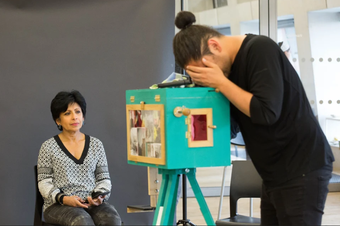Move across Tate Exchange through commissioned installations, symposia, and participatory workshops exploring living archives, the power of popular culture and crossing borders; migration, mobility and citizenship; and the politics of cultural policy, language diversity and translation.
Take part in Learning Labs focusing on the increasing restrictions on artists’ rights and freedom of expression, the political potential of the neighbourhood-led co-operative commission, and the local/global re-building of arts/culture and civic infrastructures.
Throughout the week, we’ll choreograph conversations with artists, cultural activists, academics and cultural hubs across the UK – with guest partners and participants from Beirut, Berlin, Casablanca, Dublin, Istanbul and Madrid - to explore the comparative processes of cultural democracy and new models for artistic production and collaborative, socially engaged practice.
We look forward to continuing our collaboration with Tate Neighbours; and partnering with the British Council, Plymouth College of Art, English PEN, Index on Censorship, and the design and branding agency, TEMPLO. Find out more about about the Who Are We? project.
The programme includes four ongoing commissions/installations, plus workshops, symposia, and Learning Labs.
ONGOING INSTALLATIONS
Recognise, Risk, Reimagine, Rebuild, Redistribute
What might real social change look like in practice and where are the viable blueprints? Who Are We? invites sixteen artists to make a collective, collaborative response to re-imagining cultural democracy. How do we recognise the most urgent issues? What kinds of strategic/creative risk might be involved in owning them? And how might we begin to lay the foundations to rebuild our infrastructures and redistribute power and funding? With visual, live art, spoken-word artists and dramaturges: Isabel Lima, Gil Mualem-Doron, Selina Nwulu, Stephen Tiller, Juan delGado, Hamdi Khalif, Natasha Davis, Richard DeDomenici, Zia Ahmed, Bern O'Donoghue, Farhad Berahman, Edin Suljić, Hassan Mahamdallie, Marcia Chandra, Shay D and Laila Sumpton.
Li Dû Man (Left behind)
Wars take away a lot from people. But sometimes they take away the people and leave their belongings behind. As a journalist covering the clashes in Kurdish cities in Turkey, 2015 - 2016, Zehra Dogan took the small objects she found in the debris, as testimony of a war no one was talking about. This installation tells the stories of those who fled, via what they left behind. It also invites you into a conversation and to participate in the crafting and performance of stories about place and displacement.
SoundShapes
SoundShapes invites you to walk through and experience the sounds and shapes of languages. Combining digital content, sound, embroidery, film and photography, it will take you on a linguistic and cultural journey exploring the everyday realities of diversity and cultural difference. Challenging you to rate different languages depending on how familiar you are with them and whether you ‘like’ their sound or not. The Open University researchers Inma Alvarez, Carlos Montoro and Mara Fuertes-Gutierrez build upon the AHRC project Language Acts and Worldmaking and ‘A Stitch in Time’ (which was featured at Who Are We? in 2018), to collaborate in 2019 with branding and digital agency, TEMPLO.
As Far As Isolation Goes
A performance by musician and street artist, Basel Zaraa, and live artist, Tania El Khoury, about the health experiences of refugees. This builds upon a previous collaboration As Far As My Fingertips Take Me, in which El Khoury commissioned Zaraa to record a rap song inspired by the journey his sisters made from Damascus to Sweden. In the newly commissioned As Far As Isolation Goes, Zaraa creates a song inspired by conversations with friends and colleagues who have recently claimed refuge in the UK. It uses touch, sound and interactivity to bring the audience in contact with those faced with inhumane detention centres and a mental health system that disregards people’s political and emotional needs.
Instagram Series: Tales of Precarity
17–25 May
An Instagram based storytelling project Tales of Precarity by The Open University researcher, Tim Butcher, in conversation with seven artists from Counterpoints Arts’ network. Tales of Precarity will run from 19 –25 May with a ‘story’ a day featuring an artist’s portrait and drawing upon the question ‘How do we create meaningful public dialogue about the precarities of artists who risk?’ Discover these ‘stories’ and the portraits via @whoarewe_tex
About Counterpoints Arts and The Open University
Counterpoints Arts support, produce and promote the arts by and about migrants and refugees. Their work is done in collaboration and through co-productions – with artists, arts, cultural and educational organisations and civil society activists working with refugees and migrants. Central to their mission is a belief in the ability of the arts to inspire social change.
The Open University is a pioneer of teaching, learning and research methods contributing specifically through its scholarship on collective digital identities, citizenship and governance.

